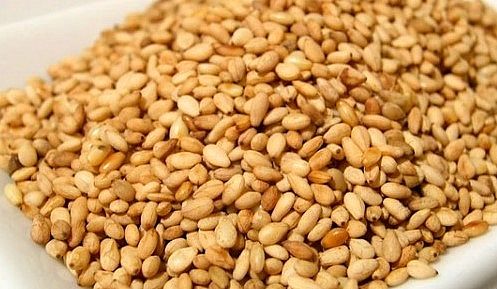Sesame (beniseed) farmers in Benue State are currently renewing their commitment to achieve massive production of the crop for local and foreign markets despite previous setbacks that reduce the state’s status from being ranked among leading producers of the crop in Nigeria.
Our correspondent reports that the challenges which bedeviled the production of sesame in recent years caused its farmers in the state to drift into cultivation of alternative crops such as cassava, cowpea and soybean for quick income.
Interestingly, sesame seed is one of 11 quick-win products selected by the Nigerian Export Promotion Council (NEPC) for intensive development and promotion to significantly boost the non-oil export volume and value, a lot more were however needed to be done by the Benue government and farmers to enable them boost production as well as earn bigger income for their produce.
Ekoja Peter, one of such farmers who in the past years abandoned the production of sesame in his Otukpo Local Government Area of the state to venture into cassava cultivation in large quantity for quick income generation, had harped his decision on several factors.
- UNICEF warns of $100bn economic loss over conflict in Northeast Nigeria
- Nasarawa govt denies sending monarchs to VP
He had in his narration experienced low productivity for four consecutive years and was terribly disappointed by the high cost of production.
It was for such reasons and many more that the Benue state government in collaboration with NEPC and other relevant stakeholders cutting across the private sector now take the bull by its horn to providing required interventions so that young farmers such as Peter would revert to sesame production as a pride commodity of the ‘food basket’ state.
Already, Akuma Lazarus Terhumba, a sesame farmer in Taraku community of Gwer East LGA of the state, has delved into the intervention for sesame farming which he considered a money spinner expected to better the lots of his household.
He said, “Beniseed farming is good and I have been into it for five years now. The one we are doing now (for this intervention season) is very nice, it grows well, it is better than the native type we were used to which doesn’t yield much.
“Before now, I used to farm rice, soybean and the local variety of beniseed. The local (native) variety of beniseed is low yielding; If you don’t have money for pest control, you can’t produce beniseed effectively. But now, I have better understanding as well as access to quality seeds of beniseed. We are 50 farmers in my cluster and just one hectare of farm land will give us three bags of harvest.”
Apart from Terhumba, the sesame farmers’ association in the state, had long emphasised the need for government to acquire modern tools for farmers and to tackle insecurity so its members at various displaced peoples’ camps could go back to doing their best in their farms.
Charles Iordye, who is the Chairman of National Sesame Seed Farmers Association in Benue State chapter in a previous interview, identified insecurity, lack of machineries to mechanised sesame seed, off-takers that can give some incentives or loans to boost production as some of the challenges facing the commodity’s farmers.
But that would no longer be an issue to worry about as in line with the mandate of NEPC, the State Coordinator, Olu Ikulajolu, now works in collaboration with relevant stakeholders from the state government and private sectors to provide required interventions, so that sesame would again be a pride commodity of Benue State in particular and Nigeria as a whole.
To this end, the NEPC state coordinator, Ikulajolu, had in recent times engaged stakeholders at various fora to identified the challenges of the commodities and agreed on the way forward.
At the end of the multiple events held at separately in Makurdi, Kastina-Ala, Logo, Gwer East and Guma LGAs respectively, it was resolved that a survey on stakeholders be conducted to identify sector players and how to bring them together for effective development action.
It was also observed that sesame seeds could be grown in all the 23 LGAs of the state with 14 of the growing areas having the potential to grow the commodity in large quantity while the meeting realized that Logo LGA used to be a major production hub but lost the steam due to glut.
Consequently, the NEPC team after a strategic meeting with the Sesame Growers’ Association at Ugba, the headquarter of Logo, adopted the area for the pilot scheme following the farmers request for an assurance of market (off-takers) and training on acceptable practices, among other demands, before they would go into planting of sesame.
As a follow-up, over 135 of them were trained on good agricultural practices in sesame production for export by an expert from the National Cereal Research Institute (NCRI) Badeggi, Niger State, who facilitated the training.
Ikulajolu nevertheless observed that in Nigeria, sesame has become an important exportable product, contributing significantly to the increased non-oil export value recorded in previous years.
He said that Benue State had the potential to use the product to solve youth unemployment, solve its fiscal challenges and earn over N6 billion yearly, if properly harnessed, adding more importantly that the maturity period of sesame is less than 120 days.
He posited, “There has been concerns about the reducing yield per hectare in Benue State due to various factors, including overused of land, lack of adequate knowledge on best practices, low access to improved varieties. There are also the issues of lack of aggregation centre, no cleaning/grading centre and other required interventions.”
Therefore in addressing the challenges, key stakeholders comprising, the State Ministry of Trade and Investment, represented by the Director of Trade, the Ministry of Agriculture, represented by the acting Director of Planning, the Chairman of Sesame Seeds Association in Benue State, the Chairman of the Logo Cooperative Group and the Off-taker also recently converged at NEPC’s office in Makurdi to brainstorm on the matter.
The NEPC state coordinator, Ikulajolu, who spoke to participants on behalf of the Council’s Executive Director/CEO, Dr. Ezra Yakusak, during the second training programme on best agronomy practices in the Sesame Production for Export, organised by the NEPC for participating farmers in Benue State, affirmed that sesame is an important exportable product to Nigeria in general and Benue State in particular.
“Therefore, NEPC would not relent on her oars to ensure that the production and export of the product is stimulated in Benue State,” Ikulajolu assured.
In her own remark, the Permanent Secretary, Ministry of Trade and Investment in Benue State, Mrs Finbarr Ngufan, thanked the NEPC for the worthwhile intervention as she expressed the readiness of the state to collaborate with critical stakeholders to ensure a better Benue.
On his part, the Secretary to the State Government, Professor Joseph Alakali, who was represented by Dr. Teryima Iorlamen, an Agronomist and Seed System Specialist with the Federal University of Agriculture, Makurdi (FUAM) now renamed Joseph Sarwaun Tarka University Makurdi (JOSTUM), maintained that the state government was always ready to partner with private and public institutions to deliver the dividends of democracy to the people of the state.

 Join Daily Trust WhatsApp Community For Quick Access To News and Happenings Around You.
Join Daily Trust WhatsApp Community For Quick Access To News and Happenings Around You.


